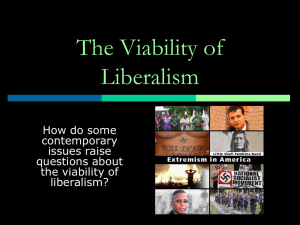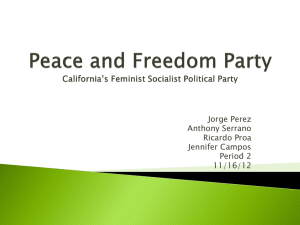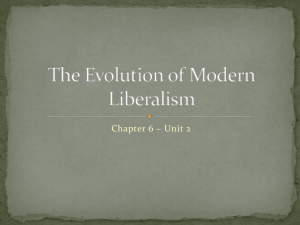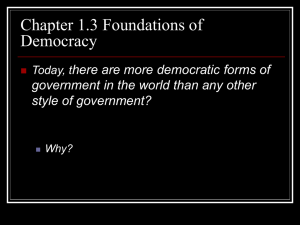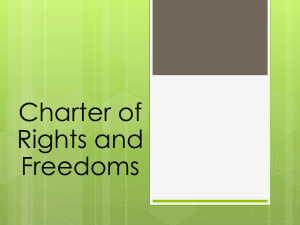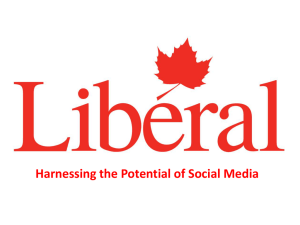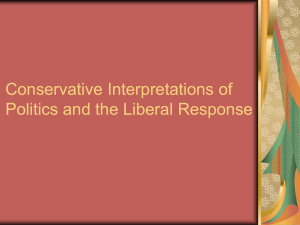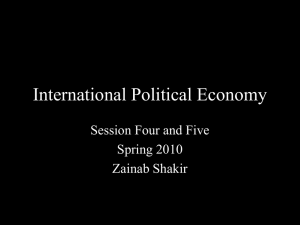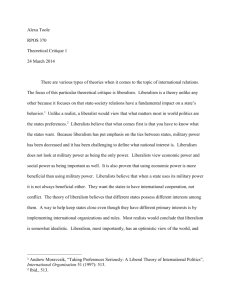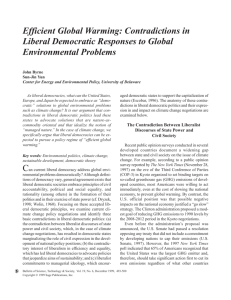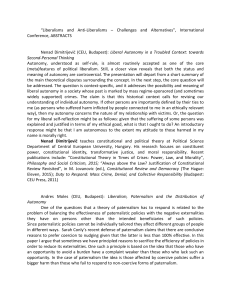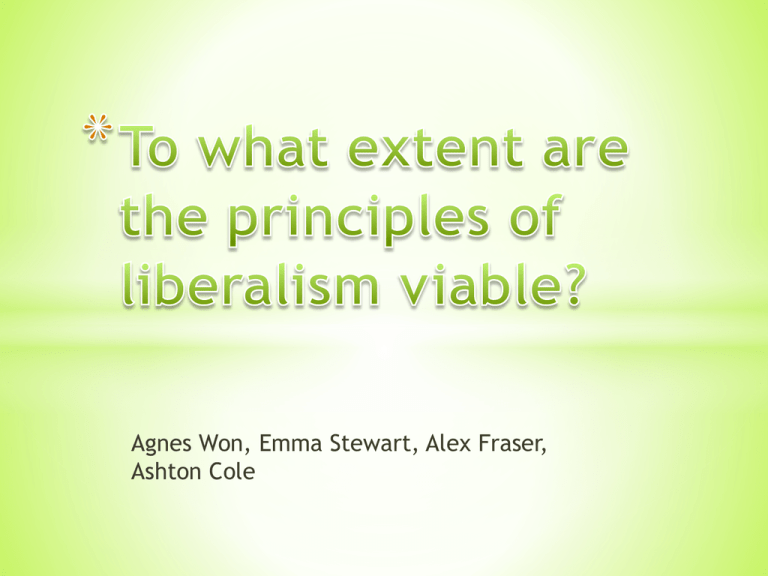
Agnes Won, Emma Stewart, Alex Fraser,
Ashton Cole
*
3.1
“Canada's high ranking on the United Nations human development scale would
dramatically drop if the country were judged solely on the economic and social wellbeing of its First Nations people. According to a new un report, Canada would be placed
48th out of 174 countries if judged on those criteria.”
This states that the country is not taking care of the first Canadians as
well as they should be. With the way the First Nations people of
Canada have been treated over the years there has become different
perspectives formed on how and what the liberal way works.
*
* There is an assumption that a pattern of change exists in the history
of mankind that it consists of irreversible changes in one direction
only and that this direction is towards improvement. The idea of
always moving towards improvement and the principles of
liberalism may contrast to those of traditional aboriginal cultures.
* All parts of creation are interconnected and manifest in the spirit of the
creator.
* Humankind must live in respectful relationship with all that has been created.
* Spiritual forces are gifts intended to aid survival rather than threaten it.
*
*
3.2
* This act was to consolidate all of the pervious colonial laws
governing the First Nations in 1876, the government of
Canada passed the act. This was the most important piece of
legislation affecting the First Nations. This act essentially
separated the First Nations people from the rest of the
population. It was written what the First Nations could and
could not do, it also said who was or was not First Nations.
The Indian act was an assimilation, used to destroy the
culture and traditions of the people it affected.
*
* In 1968 federal election, Trudeau campaigned on the platform
of creating a society for all Canadian’s. This was meaning for
all Canadian's to be treated fair and just. Trudeau wanted the
First Nations people to become apart of the society Canada
was made of. This paper was never talked over with the First
Nations people. This was a great thing to try to do if the
people that it concerned knew about it .
*
* This was the stand against white paper. The First Nations people
didn’t like the fact that they were not told of the happenings of this
paper and said they didn’t want to be assimilated.
* The legislative and constitution bias of Indian status and rights should be
maintained until first nations and Inuit are prepared and willing to renegotiate
them.
* Only First Nations and Inuit and their organizations should be given the
resources and responsibility to determine their own priorities and future
development lines.
* The Indian act should only be reviewed when treaty rights issues are settled
and if there is a consensus among First Nations and Inuit peoples on such
changes regarding their historical and legal rights
*
*
* “The will of the people…is only legitimate foundation of any
government, and to protect its free expression should be our
first object”
-Thomas Jefferson
Liberal principles is an ideal toward which many governments
aim.
Liberal democracy was born in the countries United States,
France, Great Britain and adopted elsewhere.
*
* “What I want is to get done what the people desire to have
done, and the question for me is how to find that out exactly?
“
* This a question Lincoln asked. It was a pertinent one: How
can government determine the will of the people? In Canada
where a party forms the government though it receives less
than 50 % of the votes is governed according to the will of the
people?
* WHAT IF you were in charge? How would you answer these
questions?
*
*
*
*Democracy
is a form of government
in which power is
ultimately vested in the
people.
*
*Direct Democracy
operates on the belief that every
citizen’s voice is important and
necessary for the orderly and
efficient operation of society.
Liberal principles are expressed
in this system.
*
*Representative Democracy
elects officials who represent us and
make laws based on their interests.
This is how Canada and many other
areas run. We elect who we think
represents us best. In Canada we are
lucky to have many parties to chose
from that suit our ideologies
*
* Proportional Representation
Is the system where citizens vote directly for a party and then
representatives are assigned based on the amount of popular
support obtained. Countries with proportional representation
do have more parties than countries using single-member
constituency.
Country examples: Austria, Germany, Netherlands, Argentina,
Greece, Peru, Swedan
*
*Oligarchies
*Are a form of government
in which political power
rests with small elite
segment of society.
*
*One-Party State
*Is a type of system where only one
party forms the government and no
other parties are permitted to run
candidates for the election.
*Example: China, Cuba, Laos, Syria,
Vietnam
*
*Military Dictatorship
*Is a form of government in
which political power resides
with the military leadership.
*Examples: Burma, Fiji, Libya
and Mauritania
*
*Propaganda
*A technique most dictatorships – and
indeed, most governments in general –
use to gain and maintain power is
propaganda. It issues a message designed
to influence the opinions or behaviors of
large numbers of people.
*Terror can also be used to influence the
will of the people.
*
* Over the last few years voter turnout has been decreasing. In
2008 only 59% of eligible voters voted.
* Something to think about:
Should voting be mandatory?
Voting is a free choice for us, why
aren’t people voting?
*
* The system of representative democracy is not a perfect
method of reflecting the will of the people. However
mechanisms which attempt to do so are in place, such as
responsible government.
* Does the will of the people necessarily indicate the right
course of action?
*
* Nineteenth century thinkers Alexis de Tocqueville and John
Stuart Mill used tyranny of the majority to describe one of
the potential problems in democracy: that the will of the
majority may be imposed on minorities to the detriment of
other liberal principles.
* Example: When Canada introduced legislation into parliament
to recognize same sex marriage, some Canadians wanted a
referendum to be held on the issue so they could voice their
opinions. However it was denied.
*
* One of the most important aspects of any ideology, including
those of authoritarian governments, is a vision: Vision of what
the country could be if led by a leader who could obtain the
vision.
*
*
* Sometimes when governments are trying to
pursue the common good they tend to ignore
the rights of individuals.
* In times of war, emergency, and environmental
crisis, liberal democracies may not reflect
principles of liberalism.
* Restricted people’s movement, controlled
people’s access to information, and limited
rights, freedoms, and choices.
*
* The illiberal policies were maintained in effect
for years and these polices were often not
applied to all citizens equally rather certain
groups received different treatment.
* Ex. The War Measures Act-passed in 1914
* In response to Canada’s involvement in WWI in
which the government suspended and limited
rights, freedoms, and the basic principles of
liberalism in necessity for the good of the
society.
*
* In 1988, emergencies act introduced to include
more safeguards protecting the rights of
Canadians in case of an emergency situation.
* This act limits government power during these
crisis so that temporary emergency measure
are to be taken into account of the rights of
Canadians (follows Canadian charter of rights
and freedom).
*
*
* Canadian charter of rights and freedoms
(1982): establish rights to life, liberty and
personal safety
* Necessary for individual to enjoy free will or
personal autonomy
* Strongly protected by law and can’t be easily
modified without public consent
* One limit: no individual has right to infringe on
rights of others
*
* American bill of rights (1791): first 10
amendments to US constitution confirmed by
the 13 states
* Based on John Locke’s concept of natural rights
all individuals have to life, liberty, and
protection of property
*
* Quebec charter of human rights and freedom
(1975): statutory bill of rights and human rights
code passed by national assembly of Québec.
* Stands at the pinnacle of Québec's legal system
*
* Documents such as charter of rights and
freedoms and the Quebec charter focus too
much on individual rights possibly at expense
of collective rights.
* Sometimes words in documents have little
power like in dictatorships or totalitarian
countries individual rights and freedoms are
overpowered for state needs even though they
might have documents similar to democratic
government.
*
* Group rights are achieved by extension of
individual rights
* Collective rights are individual rights applied to
groups not persons
* United states: “affirmative action” in 1960s to
address minorities and women inequalities.
* Canadian charter of rights and freedoms:
collective rights refer to rights of official
language groups and aboriginal peoples.
*
* Including collective rights and recognizing
them are different things
* Since the canadian charter came into place
groups in canada had to right to collective
rights respected
* Ex. Establishing francophone schools in alberta.
* Ex. Aboriginals in having rights to hunt and
harvest recognized even after they are
constitutionally guaranteed.
*
* Quebec:
requires that public signs and
commercial advertising must be in French.
They may be in French and another language
but French has to be predominant.
* According to Canadian charter of rights and
freedom, the freedom to thought, belief,
opinion and expression as well as freedom of
press and other media communication is being
limited.
*
*
* It can be argued that the contemporary western
world is a product of early liberal principles in
action, which makes the modern industrialized
world also the result of the implementation of
liberal principles.
* Access to resources, health care, and quality of life
available to individuals varies greatly in liberal
societies and throughout the world.
* This modern industrial world is faced with
environmental issues and must deal with the impact
of economic development.
* Debt and poverty exist among wealth within liberal
democracies, and there’s a significant disparity
among countries.
* Not all individuals and groups are treated equally.
Racism and censorship exist in some form of all
countries.
*Even though modern liberalism is
imperfect, many people illiberal
democracies consciously or unconsciously
assume that principles of liberalism
themselves are beyond criticism.
*People who live in liberal democracies
generally have a bias in favour of such
liberal concepts as the worth of every
individual, the power of human reason, the
limits of a governments reach into
individual’s lives, and a belief in human
progress.
*Additional challenges to liberal principles
can be found in the examples of
postmodernism and extremism.
*the period that follows modernism in the
fields of art, literature, and philosophy in
western societies.
*It is a school of thinking that questions and
rejects the principles of modernism and
liberalism.
*Postmodernism argues that rather than a
process for discovering truth, modernism
has constructed “governing narratives”
that tell us stories about our modern
society.
*It claims we are under a “veil of deceit”
that hides alternative ways of thinking
from us.
*
*refers to a belief system that is outside the
main stream spectrum of beliefs and it may
advocate actions that are considered
socially or morally unacceptable, such as
the violent targeting of those perceived as
innocent civilians.
*
* unanticipated consequences of economic freedom and
development have developed within countries on a world
wide scale.
* Many colonized countries were forced to reduce their
own food production in order to grow cash crops for
export.
* They were not treated in ways that reflected the
principles of liberalism.
* These feelings have also created conditions that support
violence, illiberalism, and terrorism.
* The unequal treatment of some countries and their
citizens by liberal democracies especially those most
closely associated with the principles of democracy has
left a troubling legacy in many former colonies.
*
* in response to environmental change, many
individuals and groups have resorted to
activism to focus media attention problems
caused by industry and societal practices.
* Environmental groups have been exposing some
of the offences that threaten the wellbeing of
our planet; we share a significant relationship
with all other people on earth through the
environment.
*
* an outbreak of disease on a global scale. I
* t is another example of how the principles of liberalism may be
challenged but how at the same time, they may also offer
solutions.
* While mass communication had increased our awareness of
pandemics, the ease of international travel has also precipitated
their spread.
* Liberal democracies are faced with a difficult situation when
attempting to address pandemics.
* On the one hand, limiting travel and restricting visitors, tourists,
and new immigration to a country can provide greater protection
against pandemics.
* On the other hand, such actions will hamper trade and
development, severely restrict the basic freedoms of citizens
and potentially create other issues related to human rights
violations.
*


